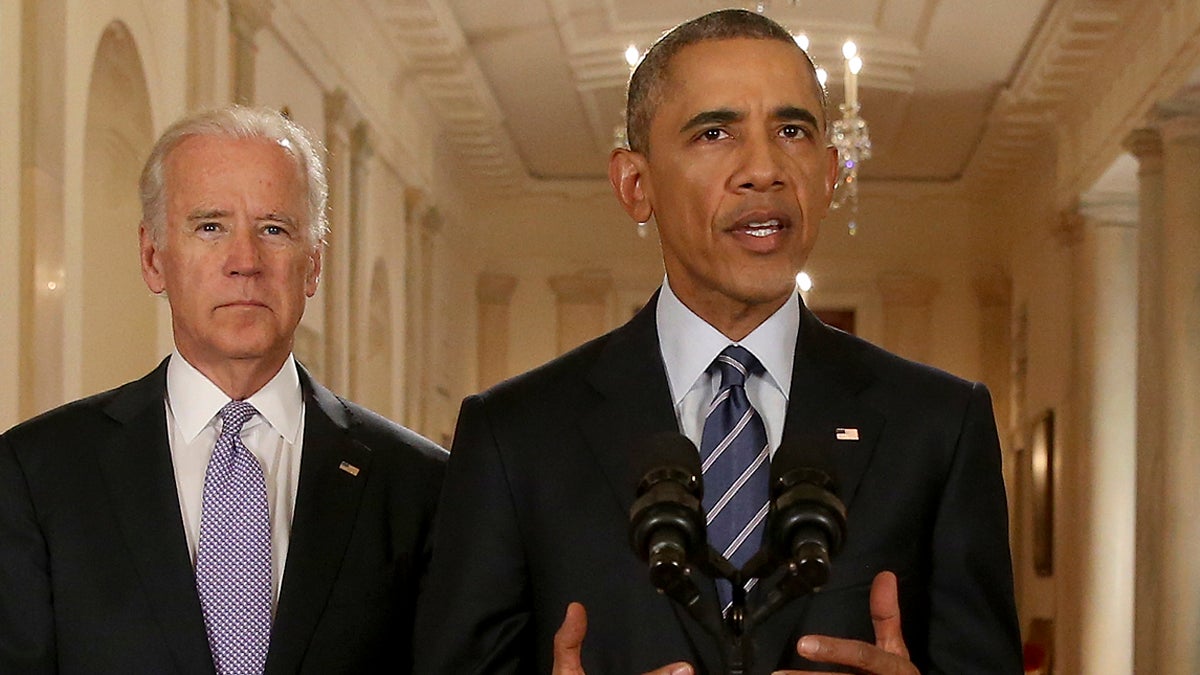Obama to Congress: ‘What’s your alternative?’

President Barack Obama, standing with Vice President Joe Biden, delivers remarks in the East Room of the White House in Washington, Tuesday, July 14, 2015, after an Iran nuclear deal is reached. After 18 days of intense and often fractious negotiation, diplomats Tuesday declared that world powers and Iran had struck a landmark deal to curb Iran's nuclear program in exchange for billions of dollars in relief from international sanctions. (Andrew Harnik/AP Photo, Pool)
President Obama was feisty yesterday in his defense of the Iran nuclear deal, mindful that congressional Republicans on Capitol Hill – and a small number of Democrats – reflexively hate it without having read it. Mindful, as well, that the best defense is a good offense, he challenged the naysayers:
“I’m hearing a lot of talking points being repeated about ‘This is a bad deal. This is a historically bad deal. This is a historically bad deal. This will threaten Israel and threaten the world and threaten the United States.’ I mean, there’s been a lot of that….What is (their) preferred alternative?
“If 99 percent of the world’s community and the majority of nuclear experts look at this thing and they say ‘this will prevent Iran from getting a nuclear bomb,’ and you are arguing either that ‘it does not or that even if it does, it’s temporary,’ or that ‘because they’re going to get a windfall of their accounts being unfrozen that they’ll cause more problems,’ then you should have some alternative to present. And I haven’t heard that.”
Obama said this, and much more, at his press conference. Congress has 60 days to decide whether to block the deal via a resolution of disapproval. If it votes thumbs down (which is virtually inevitable, since the Republicans run both chambers), Obama will veto the bill. To override a veto, Congress needs 2/3 of the votes in each chamber; if the Party of No stays united (a safe assumption), the GOP would have to persuade 13 Democrats and independents in the Senate, and 44 Democrats in the House, to abandon the president. That’s the end game.
But Obama isn’t waiting for the end game. He stated the obvious yesterday:
“(T)here really are only two alternatives here. Either the issue of Iran obtaining a nuclear weapon is resolved diplomatically through a negotiation, or it’s resolved through force, through war. Those are the options. Now, you’ll hear some critics say, ‘well, we could have negotiated a better deal.’ OK. What does that mean? I think the suggestion among a lot of the critics has been that a better deal, an acceptable deal would be one in which Iran has no nuclear capacity at all, peaceful or otherwise. The problem with that position is that there is nobody who thinks that Iran would or could ever accept that….
“So to go back to Congress, I challenge those who are objecting to this agreement, number one to read the agreement before they comment on it, number two to explain specifically where it is that they think this agreement does not prevent Iran from getting a nuclear weapon, and why they’re right and people like Ernie Moniz, who is an MIT nuclear physicist and an expert in these issues, is wrong, why the rest of the world is wrong, and then present an alternative. And if the alternative is that we should bring Iran to heel through military force, then those critics should say so.”
Obama nailed the critics’ key flaw: They don’t have a feasible alternative to this deal.
Because the alternatives to this deal are (a) to kill it and do nothing, which would free Iran to accelerate its nuke program, (b) kill it, re-start the negotiations, and push for pie-in-the-sky terms that Iran would never accept, or (c) launch a military attack, which would strengthen the Iranian hardliners and prompt Iran to accelerate its nuke program.
(Funny how this episode is so reminiscent of the flap over Obamacare. Republicans hate that too, but they’ve long been cognitively incapable of crafting, and uniting behind, any feasible alternative.)
Anyway, Obama’s implicit point yesterday was that diplomacy can be an effective way to strengthen America – as opposed to flexing military muscle (George W. Bush’s Iraq disaster), or simply doing nothing (Bush’s stance toward Iran).
In fact, let’s talk about the latter. On the nuclear issue, Bush rarely tried to engage Iran diplomatically. As one national security expert points out, “Bush stayed on the diplomatic sidelines for more than five years.” We’ll never know whether he could’ve succeeded, but here’s the bottom line: When Bush took office, Iran had no known centrifuges; when he left office, Iran was operating roughly 3,850.
There it is, the “do nothing” alternative in action. Is that better than Obama’s diplomatic deal?
And I question whether the Republicans can corral enough House and Senate Democrats to trump a presidential veto (if the fight even goes that far; it’ll take 60 Senate votes just to introduce a resolution of disapproval). It would be tough to buck one’s own president; it would arguably tougher to stiff the next likely Democratic nominee – because Hillary Clinton, a longtime hawk on Iran, has already signaled her support for the deal. In fact, she’ll give political cover to wobbly Democrats.
Obama said yesterday, with a dash of acerbity, “I am not betting on the Republican party rallying behind this agreement.” He got that right; one Republican senator, Mark Kirk, charged yesterday that Obama is being “viciously partisan” about the deal – and then proceeded to equate Obama with Neville Chamberlain. But in the end, this historic achievement may well go forward with the GOP stewing on the sidelines. It wouldn’t be the first time.
Follow me on Twitter, @dickpolman1, and on Facebook.
WHYY is your source for fact-based, in-depth journalism and information. As a nonprofit organization, we rely on financial support from readers like you. Please give today.

